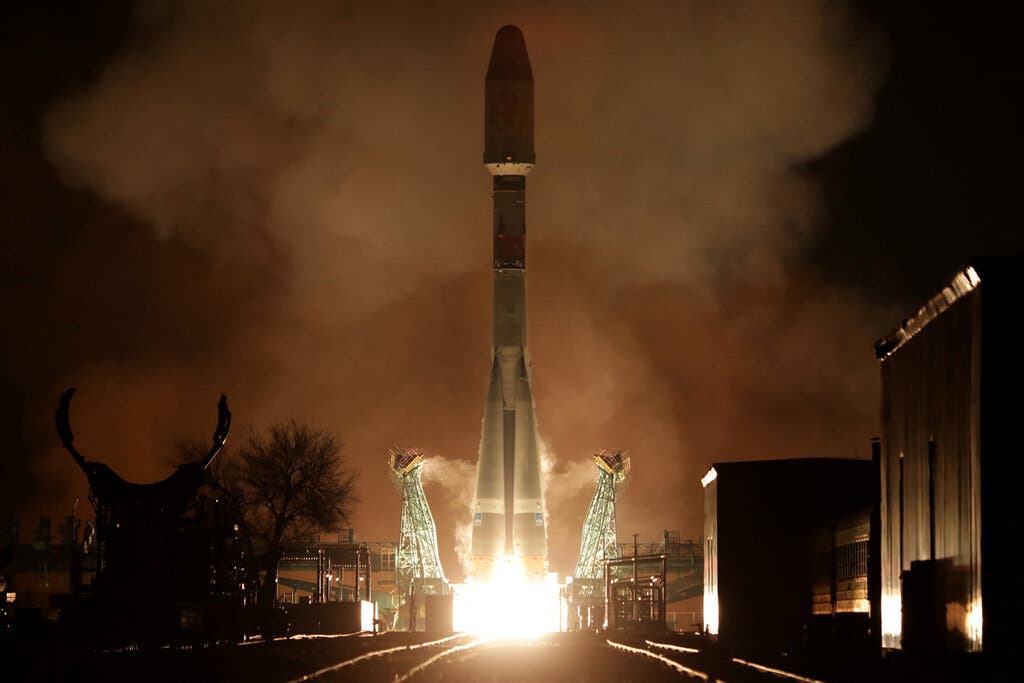Earlier this week, OneWeb, a satellite internet company partly owned by the British government, announced that it would cancel an upcoming satellite launch using a Russian rocket and would suspend all future launches that relied on Russia. The decision followed a heated public standoff with Roscosmos, Russia’s space agency, which culminated in a public protest on Thursday.
Also on Thursday, the Russian space agency Roscosmos stated that it will no longer supply rocket engines to American firms.
Those actions, which are both repercussions of Moscow’s invasion of Ukraine, are likely to further isolate the Russian space agency from its Western space partners while also severely restricting Russia’s commercial space activity. With the loss of OneWeb’s trusted rocket source for launches, the firm faces new obstacles as it works to finish its constellation of 648 satellites in orbit, which it had hoped to accomplish by the end of the year.
The British government and other investors came to the aid of OneWeb in 2020, saving the company from bankruptcy. In order to do this, a Russian Soyuz rocket from Kazakhstan was slated to launch 36 satellites on Friday. Since 2019, the business has launched over 400 satellites into orbit, all of which have been launched using the Soyuz rocket, a workhorse rocket that has been in service since the Cold War space competition.
Russian space director Dmitry Rogozin, however, issued two conditions on Wednesday, just after the Soyuz rolled out to the launch pad in preparation for its flight. The restrictions were designed to offset sanctions imposed on Russia after its invasion of Ukraine. Unless the United Kingdom removed its multibillion-dollar investment in OneWeb and the business gave a “assurance that its satellites would not be utilised for military reasons,” the space agency said it would not continue with the satellite mission.
OneWeb has previously been under fire from British MPs to follow in the footsteps of energy corporations in terminating commercial connections with Russia. The business had paid for its Russian launches in bulk via Arianespace, a French rocket company, and had six more missions left on the contract — a launch lineup that was likely worth hundreds of millions of dollars — when the contract was terminated.
One of Russia’s most important commercial clients was crippled by the country’s decision to do so, and it was perhaps the most dramatic example yet of how the conflict in Ukraine was spilling over into space, an area in which the country has for decades found cooperation with countries that were once Cold War adversaries.
According to Victoria Samson, a space policy expert at the Secure World Foundation, Russia’s isolation from its Western allies seems inevitable as a result of the onslaught of Western sanctions in response to the invasion of Ukraine.
NASA, which runs the International Space Station in partnership with the Russian space agency Roscosmos, has said that it plans to continue working with its Russian colleagues. Crew Dragon, a SpaceX vehicle that transports NASA people, has been under consideration by the two partners as a possible launch platform for Russian spacecraft.
Russia said on Thursday that it will suspend the supply of rocket engines to American firms, in addition to its collaboration with NASA.
The ban may have the greatest impact on Northrop Grumman, which relies on Russian-made engines for its Antares launch vehicle, which transports supplies to the International Space Station on NASA’s behalf. SpaceX, as well as spacecraft launched by Japan and Russia, also offer this service to the International Space Station.
More symbolically, Mr. Rogozin said that Russia would no longer give support in the use of a separate Russian engine that had already been acquired and was being utilised by United Launch Alliance for the Atlas 5, which is one of the most commonly used American rockets at the time.
Tory Bruno, the chief executive of the United League of America, downplayed the significance of the loss of technical assistance from Russia, stating, “If it becomes essential, we can manage without.”

